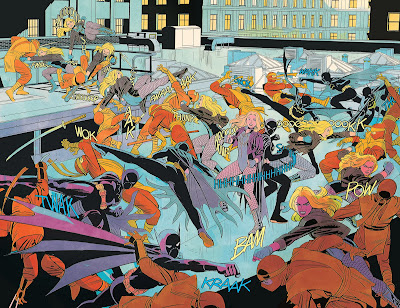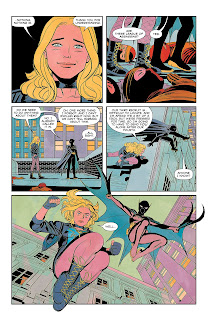Recently I came into some stuff for the early editions of
Chaosium's Stormbringer game. This fills a hole in what I actually do collect in gaming because, even though
Michael Moorcock is one of the few fantasy writers whose work I enjoy, because I never really liked the early editions of the game. What I wish that I could tell my younger self is that a game can still be good, even if it doesn't fulfill what it is trying to do.
I'm sure that's a confusing sentiment. Hopefully, I will make it clearer as I put this post together.
I picked up on the second edition of
Stormbringer, and the supplement/stand alone game (don't ask, it was the 80s)
Hawkmoon, both adapted from the works of British fantasist
Michael Moorcock, when a friend brought them to college with him. I was already familiar with
Chaosium's horror game
Call of Cthulhu, because I had picked up one of the boxed sets while I was in college, and I had a passing familiarity with
Runequest at this point, but
Stormbringer was new to me. I borrowed the two boxed sets that he had in his dorm room and read them (each game is probably less than 100 pages of text, so this wasn't that hard). My diagnosis? I hated the game. I felt that, despite being a well made game, it did a bad job of simulating
Moorcock's works, and because of that I wasn't interested in the game. I wouldn't come back to the game until the
Elric! edition (probably closest to being a 4.5 edition of the rules) a number of years later.
While I still think that the first few editions of the game aren't very good at simulating
Moorcock's works, I do think that
Stormbringer (talking the first through third editions) is probably one of the best dark fantasy games, perhaps second only to first edition
Warhammer) that the RPG "business" has managed to produce.
I admit that I have never really been a huge fan of the
Dungeons & Dragons stream of fantasy role-playing games. Class and level based games just don't get me as interested, which is why I am more interested in the games that
Chaosium has produced over the years. I
love dark fantasy. Whether we're talking about
Moorcock or
Smith or
Howard or any number of other writers in the genre, that kind of fantasy gets me a lot more interested than the works of Tolkien or his imitators. This is why I regret missing out on
Stormbringer for so many years.
Really, we have two "streams" of
Stormbringer. I don't want to call them editions (since there were in fact five or so editions of the game), but there was definitely a philosophical shift in the game between the third edition (produced by
Chaosium in conjunction with
Games Workshop...which would inspire the creation of their house game
Warhammer) and the fourth edition. While the game did move closer to the source material with the fourth edition, it also managed to somehow become more generic at the same time. I'm not really sure how that happened. For the rest of this post, I'll refer to the first three editions as
Early Stormbringer and 4th,
Elric! and 5th edition as
Later Stormbringer. There's no real judgment in this split, it just seems the best way to break up the conversation.
Why do I think that
Early Stormbringer is such a great dark fantasy game? Where other RPGs had magic-users who could throw fireballs,
Early Stormbringer would have your sorcerer character summon and bind a fire elemental to their will and then compel it to throw fire at your opponents (or perhaps you could even throw an elemental at people, even though this would be a wasteful use of an elemental). This flavor difference alone makes for a whole new gaming "ballgame." In the
Later Stormbringer, this was diluted by the addition of spells with more traditional effects.
"Classes" in the game aren't really classes in the sense of
D&D, and they aren't yet quite the Professions or Occupations that we will find later in other Basic Roleplaying Games, either. They are a cluster of skills and bonuses to skills that make character generation go quicker. When you have a class-based game and you want a "Fighter," you just pick the appropriate class, roll up some attributes and go. In games like
Runequest this process can take longer because you have to pick out all of the relevant skills and everything else.
Stormbringer shortened this process with their classes. Combined with random determination, it might actually make
Early Stormbringer characters as fast to make as an early edition
D&D character. And considering how fragile characters could be in either game, fast character generation could be important.
As often as not in the early days of gaming, I think that
Ken St. Andre and
Steve Perrin accidentally created a game that was so much better than the one that they intended to create. For example,
Stormbringer characters were much more "heroic" than early edition
D&D characters, without being the "super-heroes" that a lot of old school gamers disdain. I like a "heroic" character much more than I like the zero-to-hero approach. I want to play Conan or Elric. I don't want to play the guy who is going to be Conan or Elric.
I think that much of the stripped down and quicker approach of the rules owes itself to the design sensibilities of
St. Andre. His
Tunnels & Trolls rules were the definition of stripped down, in an era when even
D&D didn't have a lot of rules. His approach to gaming is to keep things simple. Combined with the sensibilities that would bridge between how
D&D was played and how
Runequest would be formulated (
Perrin came up with the highly influential and widely adopted
D&D house rules known as the
Perrin Conventions that would inform the creation of the
Runequest rules),
Stormbringer is a tight little example of how a game can be simple while still being a highly robust engine.
If I had to state a preference between
Early Stormbringer and
Later Stormbringer, it would probably have to be for
Early Stormbringer. The simplicity, the ingenuity and the robustness of the design all combine in a game that hits a sweet spot for me. The best part is that the fact that, for me, it didn't do a good job at simulating
Moorcock's work just means that it all that much better of a game to use for a variety of campaigns that I would like. I wish that I could go back and tell my younger self to get over it and play the damn game. This way I would have decades of fun with this game behind me, and I probably would have spent a lot less time looking for "the right game" for my fantasy needs. Luckily, that isn't a worry anymore.
I think that I want to add a
Red Sonja game using
Early Stormbringer to my gaming bucket list now.
If you're interested in a "clone" of
Later Stormbringer (the
Elric! version and 5th edition), be sure to check out
Chaosium's excellent
Magic World game. This is (basically)
Stormbringer 5e with the specific
Moorock-related IP stripped out, leaving behind a
really good set of fantasy rules. Unfortunately no "clone" of the earlier, more rollicking, editions of
Stormbringer yet exists.
Stormbringer also still exerts an influence on contemporary role-playing games. The seminal indie game
Sorcerer by
Ron Edwards shows an influence of the demon summoning from
Stormbringer in its own demon summoning rules.


































